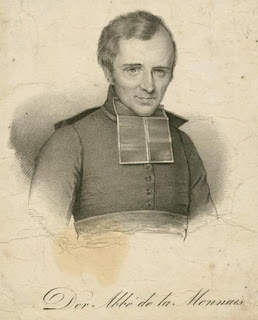"Bless Jesus and Lincoln"
by Emily Suzanne Clark
My
post today is a “this day in history” from my dissertation research. My
dissertation examines how the beliefs and practice of Spiritualism helped Afro-creoles
mediate the political, social, and cultural changes in New Orleans as the city
moved from the antebellum period through Reconstruction. The messages the Cercle Harmonique received from the
spirit world and the spirits who sent them offered the circle a forum for
airing their political grievances and a place to imagine a more egalitarian
world. Certain republican ideals, particularly those inherited from the memory
of the French Revolution, were reinvigorated and reworked to relate to
contemporary issues. While American religious history typically associates Spiritualism with white, liberal Protestants living in the northeast, I explore Spiritualism as practiced by New Orleanian Afro-creoles.
 On
March 25, 1869, the spirit “Lamenais,” a spirit who frequented the circle’s
table, came to compare President Abraham Lincoln and Jesus. This wasn’t the
first time that he taught via comparison; on another occasion this spirit
explained how the creation of the US and the birth of Jesus both signaled new
eras in humanity. This spirit, “Lamenais,” though spelled with only one “n” in
his séance record sign-offs, was French priest Hugues-Félicité
Robert de Lamennais
(1782-1854). Lamennais was raised in a royalist household, but as
he became increasingly interested in politics, Lamennais became more critical
of the French Church and the government. He argued that the role of the Church
was supposed to be fighting for the people, reforming society, and advancing
justice. It would be his 1834 publication Paroles d’un Croyant (Words of a Believer) that would
get him officially condemned by the Vatican in the Papal Encyclical Singulari nos (July 7, 1834).
And his support for the Revolution of 1848 and his election as a deputy for
Paris to the Constituent Assembly certainly didn’t help his standing with the
Pope. But it made him popular in New Orleans. Lamennais’s Catholic background,
combined with his willingness to be critical of the Church institution and “tyrants”
of any form made him an attractive spirit for the Afro-creole Cercle Harmonique, who themselves came
from creole Catholic families.
On
March 25, 1869, the spirit “Lamenais,” a spirit who frequented the circle’s
table, came to compare President Abraham Lincoln and Jesus. This wasn’t the
first time that he taught via comparison; on another occasion this spirit
explained how the creation of the US and the birth of Jesus both signaled new
eras in humanity. This spirit, “Lamenais,” though spelled with only one “n” in
his séance record sign-offs, was French priest Hugues-Félicité
Robert de Lamennais
(1782-1854). Lamennais was raised in a royalist household, but as
he became increasingly interested in politics, Lamennais became more critical
of the French Church and the government. He argued that the role of the Church
was supposed to be fighting for the people, reforming society, and advancing
justice. It would be his 1834 publication Paroles d’un Croyant (Words of a Believer) that would
get him officially condemned by the Vatican in the Papal Encyclical Singulari nos (July 7, 1834).
And his support for the Revolution of 1848 and his election as a deputy for
Paris to the Constituent Assembly certainly didn’t help his standing with the
Pope. But it made him popular in New Orleans. Lamennais’s Catholic background,
combined with his willingness to be critical of the Church institution and “tyrants”
of any form made him an attractive spirit for the Afro-creole Cercle Harmonique, who themselves came
from creole Catholic families.
The
message channeled by the medium 144 years ago covered a lot of territory.
Lamennais expressed his approval of Narciso López’s attempts for
Cuban independence from Spain; he predicted that through the “mysterious ways
of the Divine Providence, Human Slavery shall disappear little by little on
this continent;” he discussed the continuous struggle of “Progress” and “Truth” versus “moral slavery;” and he reprimanded Catholic priests in the South for their
support of the Confederacy “preaching the sanctity of the horrible institution
of slavery” and “blessing banners of the battalions which were forging new and
stronger chains for their brothers.”
 A
key part of his message was his discussion of Lincoln—Lincoln who “sealed with
his precious blood, the funeral stone which must cover Human Slavery.” For
Lamennais, the comparison between Lincoln and Jesus was a simple one. “One died
for Humanity; the other was sacrificed for wishing to liberate the black race,
subdued under a degrading yoke by brute force.” Indeed, Lamennais’s message
concluded with the sentence, “Bless Jesus and Lincoln: one will regenerate
Humanity; the other, the Republic of the United States.”
A
key part of his message was his discussion of Lincoln—Lincoln who “sealed with
his precious blood, the funeral stone which must cover Human Slavery.” For
Lamennais, the comparison between Lincoln and Jesus was a simple one. “One died
for Humanity; the other was sacrificed for wishing to liberate the black race,
subdued under a degrading yoke by brute force.” Indeed, Lamennais’s message
concluded with the sentence, “Bless Jesus and Lincoln: one will regenerate
Humanity; the other, the Republic of the United States.”
The
pro-Lincoln, pro-republicanism, anti-slavery message jived with the political
goals and orientation of the Afro-creoles at the séance table that spring of
1869. And the message came with authority. A revolutionary Catholic priest not
only chose to communicate with the circle but he also shared their political
views and, with them, hoped for continued progress.

Comments